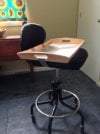Thank you, Celle! I thought about this in terms of needs, and here's how I'm handling (or wish I had handled) things. I have a two-story house with bathrooms on the upper story, so that's where I'm parked. Kitchen is out of reach downstairs. (Ground-floor exit in hillside home on both floors.)
Ice Big camper-sized cooler full of ice, in bathtub, with blanket thrown over it so I can refill cryo-cuff out of cooler
Meds Notebook for journaling meds and time taken, meals, therapy, etc
Staying clean Taking phone with me to shower, using a bench in the shower so dizziness is not an issue. Laundry is upstairs, and I have not found running loads to be a problem; have cleaning products within easy reach. Baby-wipes for between showers.
Food Having mini-frig and microwave on same floor I’m staying on; wheelchair available for additional mobility. Know that you might be a little more food-fussy than normal, because you're not feeling well and your appetite will be diminished. It's hard to eat anything non-appealing. So prepping some of your favorite foods ahead could be helpful. Anticipate craving healthful foods: fruits, veggies, protein. Have a few treats on hand, too. (Dark chocolate!) Disposable cups, plates, bowls, and silverware. Even if you're ecologically opposed, there's probably not a more justifiable time to use them. Kitchen-sized trash can upstairs in my food prepping area with extra bags stored in bottom. Exterior trash can with liner in it next to outside door.
Caretaking plants and animals Put out a pot of water on floor for cat, and a bowl of dried cat food Explaining to people who water plants to just drench the outdoor potted plants. I wish I'd bought those self-watering glass-bulbs for the houseplants.
Moderating temps (keeping house warm or cool) Non-issue, as I scheduled surgery for summer; if this was winter, it could be more critical, so definitely think this factor through when scheduling surgery, especially if you live in a place with extremes in climate, or have extenuating circumstances like heating with firewood. Summer? Screens on windows, exterior sunshades down before surgery. Fan available in bedroom, `nesting' room.
Miscellaneous Phone chargers available at bedside If you have family birthdays or other special holidays coming up post-surgical, pick up cards and gifts before surgery. If you have home-health PT coming in, and someone else is responsible for scheduling that, make sure it's done before surgery! Talk with the person who will be in charge of coming out and have something set up for your return before the surgery. (Ask me how I know.)



 New Zealand
New Zealand

